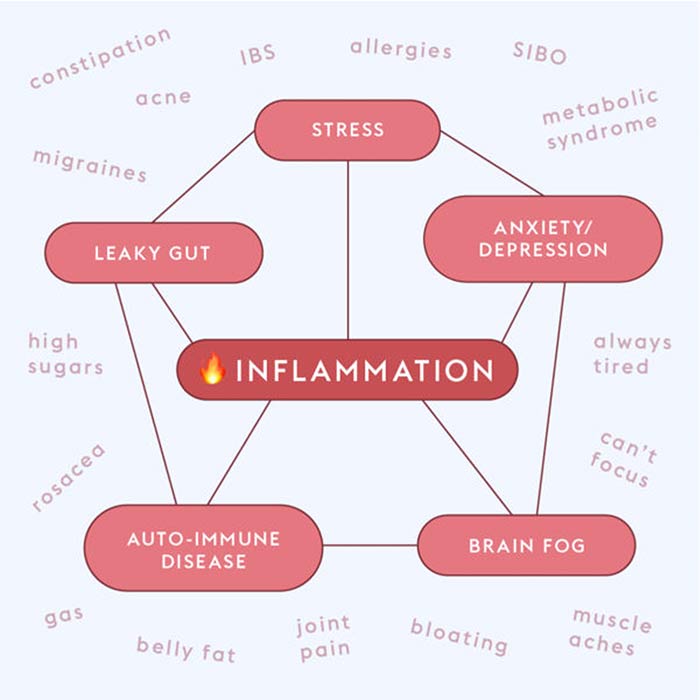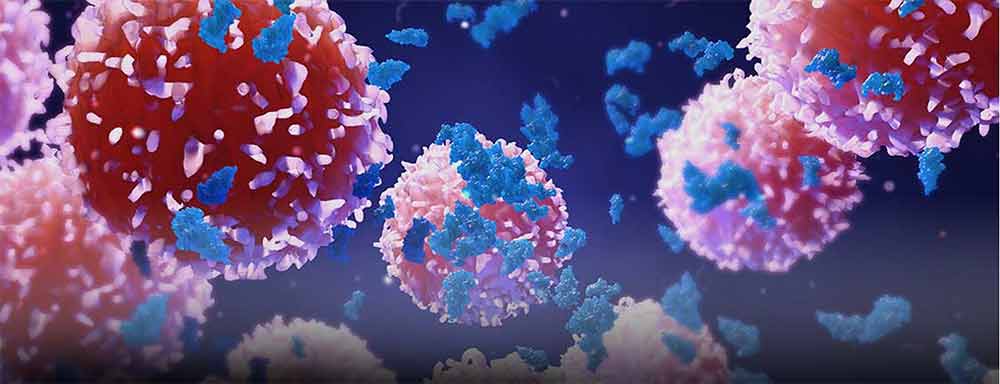What Causes an Autoimmune Disease?
The development of autoimmune disease is a complex process that requires multiple factors to come together. Each person has a unique set of circumstances that result in their specific reason for developing autoimmune dysfunction. Multiple factors or triggers can contribute to creating the dysfunction that ultimately causes the immune system to go haywire. These triggers include compromised digestive function, compromised detoxification systems, chronic inflammation, environmental toxins, and traumatic emotional and or physical stressors. All of these factors combined with your unique genetic makeup contribute to the development of autoimmune problems. This is why functional medicine is uniquely designed to address autoimmune issues.
Compromised Digestive Function
The connection between digestive function and autoimmune disease is well established. Poor digestive health can result in a multitude of conditions that can trigger autoimmune disease. A condition known as a leaky gut has been linked to the development of autoimmune disorders.
What is a Leaky Gut, or Intestinal Permeability?
The gut is naturally permeable to very small molecules in order to absorb nutrients in your food. In fact, regulating intestinal permeability is one of the basic functions of the cells that line the intestinal wall.
The GI tract is comprised of tiny epithelial cells that, together, form a tightly woven barrier between the interior of the body (your blood and circulatory system) and the exterior (or the GI tube). This barrier performs two critical roles.
First, it takes in micro molecules from digested food particles that the body then uses as a source of fuel. The epithelial cells directly absorb these micronutrients.
The second important task is to restrict the passage of larger macromolecules into the bloodstream. When the intestinal barrier is sound, toxins and bacteria or larger undigested food particles cannot enter the bloodstream. But when the lining starts to become porous as the intestinal mucosa begins to break down, you now have a “leaky gut”. As the larger compounds pass through into the circulatory system, the underlying intestinal immune system reacts against the foreign undigested proteins. This results in an amplified overall immune response, increased intestinal inflammation, and a cycle of further damage and permeability to the intestinal lining.
When your gut is leaky, things like toxins, microbes, undigested food particles, and more can escape from your intestines and travel throughout your body via your bloodstream. Your immune system marks these “foreign invaders” as pathogens and attacks them. The constant onslaught of inflammation from your immune system causes a widespread immune response throughout your body. (1)
This Leaky Gut condition is one way digestive health can contribute to your autoimmune disease.
Compromised Detoxification Systems
The detoxification system is very important in understanding the many mechanisms behind the development of autoimmune disease. Our bodies have multiple systems to identify and eliminate toxins in our body. These include the liver, intestines, lymphatic system, respiratory system, kidneys, skin, all in conjunction with the immune system. The immune system’s job is to identify any foreign invaders then create an appropriate response with the help of the other systems mentioned. When the body cannot effectively eliminate toxins, the immune system can be overburdened and contribute to the development of autoimmune disease.
Chronic Inflammation
Chronic inflation can be the source of immune disfunction and ultimately contribute to autoimmune disease. All autoimmune conditions at their root are connected by one central biochemical process: A runaway immune response also known as systemic inflammation that results in your body attacking its own tissues.
The reason inflammation is so critical is that it has been found to be a player in almost every chronic disease. And if inflammation hasn’t been shown to be associated with a chronic disease, it’s probably just because no one has looked for it. (Yes, there are common signs of inflammation and chronic inflammation symptoms you can be on the lookout for.)
You probably wouldn’t be surprised to hear that inflammation is a major part of autoimmune diseases since they are all directly caused by the immune system. Maybe you’ve also already heard that the white blood cells that sneak into the walls of your arteries are major contributors to cardiovascular disease, meaning it’s not just about cholesterol build-up but could be signs of chronic inflammation. Perhaps you also know that cancer tends to form in areas that are chronically inflamed. But you might not have expected inflammation to be a component of osteoarthritis, a disease that scientists thought was just from the wear and tear of the bones. Inflammation even plays a role in hypertension and depression. (2)

Environmental Toxins
Environmental toxins are a big problem when it comes to autoimmune disease.
How Toxins Cause Autoimmune Disease
We know that environmental factors, including toxins, infections, diet, stress, hormones, and more play a huge role in triggering and worsening autoimmune disease.
In fact, research has shown that genetics account for only 30% of autoimmunity, and the remaining 70% can be attributed to environmental causes and intestinal permeability (also known as leaky gut). This constellation of factors causes your immune system to malfunction and attack your own body by mistake.
The specific organs or tissues being attacked varies by condition. In the case of Hashimoto’s and Graves’ the thyroid is attacked, in rheumatoid arthritis it’s your joints, for multiple sclerosis it’s your nerves, and so on.
There are 3 primary theories for how toxins contribute to this malfunction.
One is that toxins damage the cells in your body so much that your immune system no longer recognizes them and attacks them on accident.
Another is that toxins stimulate an immune response, causing chronic inflammation and stressing your immune system until it becomes overwhelmed and starts misfiring.
The third theory is that toxins damage your thymus, which regulates your immune system and produces the cells that differentiate your own tissues from outside invaders.
The good news is that by identifying and addressing the environmental factors contributing to your autoimmune disease (including toxins), you can restore your body’s optimal immune function, stop its attack on your body, and reverse your condition. (3)
Traumatic Emotional and/or Physical Stressors
A common description from autoimmune patients is that their symptoms started after a traumatic event.
The Stress and Autoimmune Disease Connection
Stress has a serious impact on your brain. Chronic daily stress observed on an MRI scan of the human brain looks the same as the effects of PTSD. Your brain changes when you are dealing with trauma, stress, or depression, causing hypothalamic pituitary adrenal (HPA) axis dysfunction.
Your hypothalamus links up your nervous system and your endocrine system via the pituitary gland. In turn, the pituitary gland secretes adrenocorticotropic hormone (ACTH) to stimulate hormone production in the adrenal glands.
The adrenal glands release into your body:
- Cortisol – known as the stress hormone, normally cortisol helps the body process food and regulate blood sugar. It is also a known suppressor of your immune system.
- Adrenaline – the hormone responsible for the fight or flight instinct. In times of stress or trauma, the continued triggering of adrenaline can deplete energy levels and create added strain.
- Noradrenaline – works alongside adrenaline and focuses your attention by releasing glucose into your blood.
If you experienced high levels of stress, it may have caused depression, anxiety, low-self-esteem, anger issues – or, ultimately, your autoimmune disease. But the good news is that your brain is incredibly adaptable, and by working on yourself emotionally, you have the potential to change the density of the grey matter of your amygdala.
That’s the amazing thing about the human body – and the truth I come back to again and again as a functional medicine practitioner: Nothing is set in stone. You can make changes in your lifestyle, diet, and mental health which allow your body and brain to adapt and improve. (4)
Your Unique Genetic Factors
Genetics plays a role. Your unique genetic makeup has an influence on every aspect of your life. This is the reason that autoimmune conditions can run in families. You might have a mother or grandfather who has a similar autoimmune disease as you.
When people hear that their genes can be the cause of their autoimmune disease the common response is that they cannot change their genes. While this is true, it does not mean that they have no control over their health.
The genes you have came from your ancestors. Those genes gave your ancestors a competitive edge base on the lifestyle and diet they were exposed to. Bad genes don’t get passed on. If you understand human evolution, the idea is that if your ancestors were Eskimos, their environment was cold and their diet was mostly fish and blubber. People with genetic traits that allowed them to survive and thrive in a cold climate eating nothing but blubber did well and lived long, healthy lives. Those that did not have those genetic traits did not do well and died early. Over time, the success of the cold, blubber eating genes created more offspring and the group known as Eskimos all had these genes that allowed them to survive and thrive in this harsh environment.
Now, if you have those genes and live the modern American lifestyle, your ability to eat carbohydrates like pizza and Gatorade is not going to be good. Your genes have poor carbohydrate handling ability, and you will become unhealthy if you continue to eat this way. If you go back to eating almost no carbohydrates and eat more fat and protein your genes will be happy again. Your genes are there because they allowed your ancestors to thrive. In the modern world, our food and environment has changed dramatically, and our genes don’t like it.
The reason that autoimmune disease runs in families is not that the genes are bad but that the lifestyle does not support those genes. In functional medicine, we understand that each person has a unique genetic makeup and they need specific lifestyle and dietary choices to support their genes and create optimal health.
Schedule your free consultation with Dr. Mark Scott at Total Health Center Virginia Beach today! We look forward to helping you feel better.
Disclaimer: This page is for informational purposes only. It is not designed to substitute for professional and individualized health advice. Please do not stop or start taking prescription medication without the advice of your prescribing doctor, as this can be very dangerous to your health. You should always consult your prescribing doctor regarding prescription drugs.
References
(1) https://www.drhagmeyer.com/identifying-your-autoimmune-triggers/leaky-gut-and-compromised-gi-function/
(2) https://www.parsleyhealth.com/blog/5-signs-chronic-inflammation/
(3) https://grassrootsfunctionalmedicine.com/blog/toxins-linked-autoimmune-disease/
(4) https://www.robynpuglia.com/can-anxiety-cause-autoimmune-disease/

